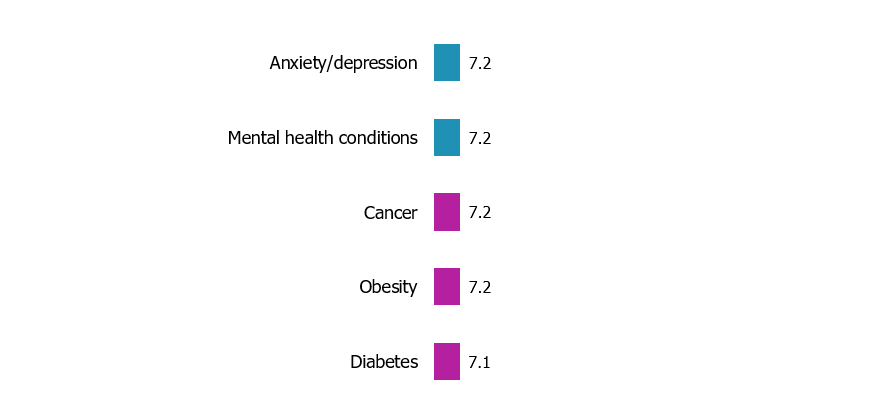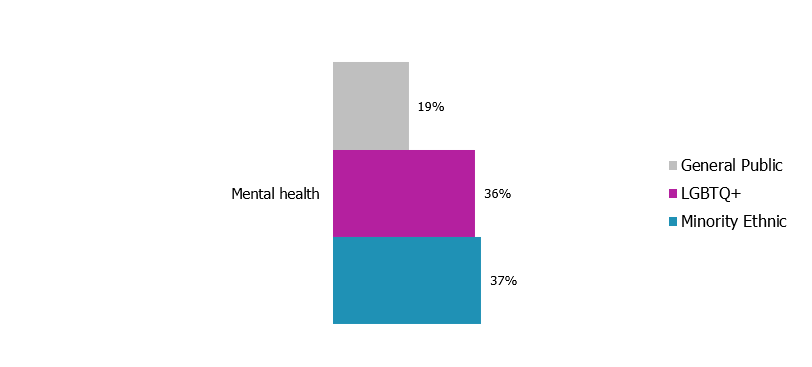Blue Monday is upon us! It falls soon after the holiday season, and is known for being the saddest date of the year. Personally, I would prefer it if we didn’t label certain days as the happiest, the saddest, the most mediocre… but there you go, the third Monday of January is supposedly the bluest day of the year. Samaritans is rebranding this day as Brew Monday, reminding everyone to reach out and have a catch up with the people we care about. After all, let’s accept, there is really no such thing as ‘Blue Monday’, and no calendar can decide on our moods.
Thanks to high impact campaigns and initiatives by mental health and wellbeing charities, we are increasingly more confident in talking about our mental health, and stigma has reduced. We are talking more about our lived experiences and there is less ‘othering’ of mental health. There is better understanding of the complexity of people’s lives and the importance of mental wellbeing, particularly since the pandemic.
The British public view anxiety/depression and mental health conditions as among the most common health conditions in the UK, putting them on par with cancer and obesity in terms of perceived prevalence (Chart 1). Personal mental health is one of the biggest concerns of the public across all nations of the UK, and is of particular concern for people in Wales and Northern Ireland. When looking at demographic groups, younger people (particularly those aged 16-34), women, and lower social grades are markedly more concerned about this issue.
Chart 1: Anxiety/depression and mental health conditions perceived by public to be the most prevalent conditions

"Please rate how prevalent you think the following conditions are in the UK at the moment from 1 to 10, where 1 is very rare and 10 is very common." (Top 5 conditions)
Source: Charity Awareness Monitor, Sept 21, nfpSynergy | Base: 1,000 adults 16+, Britain
Mental health has moved out of the confines of the broader ‘health’ or ‘disability’ charity sectors and has grown to such an extent that it now stands as its own distinct cause. Our data shows that mental health is a very popular cause across all nations of the UK, particularly standing out in Wales and Northern Ireland. Again, like the patterns we see with concern, mental health is a more popular cause among women and young people. When looking at marginalised groups such as people from minority ethnicities or those who identify as LGBTQ+, we see that mental health is significantly more popular as a cause among these audiences (Chart 2). Mental health clearly resonates more amongst those who have experienced inequality.
Chart 2: Mental health a significantly more popular cause among our LGBTQ+ & Minority Ethnic samples

“When you think about your favourite charities, which category do they fall into?"
Source: LGBTQ+ Charity Engagement Survey, Oct 21 | Base: 1,001 adults 16+, Britain; Source: Charity Awareness Monitor, Sept 21 | Base: 1,000 adults 16+, Britain; Source: Minority Ethnic Charity Survey, Mar/Apr 2021 | Base: 1,014 adults 16+, Britain
In terms of the key players, Mind is the sector leader and most forefront charity both in Great Britain as a whole, and across all the nations (even where it does not operate). Mind is clearly out in front of the pack when we ask the public to name a charity working in the areas of ‘mental health and wellbeing’, ‘mental health’ and ‘prevention in mental health’. Out of our top 25 charities by prompted awareness in Charity Awareness Monitor, Mind is also the only charity that has grown significantly since 2014.
Many mental health charities, including Mind, Rethink Mental Illness, and CALM have seen significant increases in their prompted awareness over the course of the past five years. Among the wider charity sector, many household brands are seeing declines in their prompted awareness levels. This is likely driven by less awareness among younger demographics, fragmented media consumption, and the role of corporates in enabling people to fulfil their altruistic needs. There are a small handful of brands who are growing, particularly in the mental health, food poverty, and cancer sectors. Social movements and campaigns (such as Black Lives Matter and Extinction Rebellion) have also seen strong organic growth in recent years, but these are also more polarising, and don’t always win public favour or trust. To read more about our take on successful brands of 2021 please read our blog written by Tim Harrison-Byrne “Overcoming the hurdles: five charity brands that have impressed recently”.
It is true that low mood is more common during the winter months, but oversimplifying it in a Blue Monday formula might put extra pressure on people dealing with anxiety and depression. Instead, we can all listen to Samaritans and try to be ‘a good listener’ in January and throughout the year. If you are interested in some active listening tips or little tips to help someone open up please follow the links.

